Home offices are here to stay. Don't get left in the cubicle.
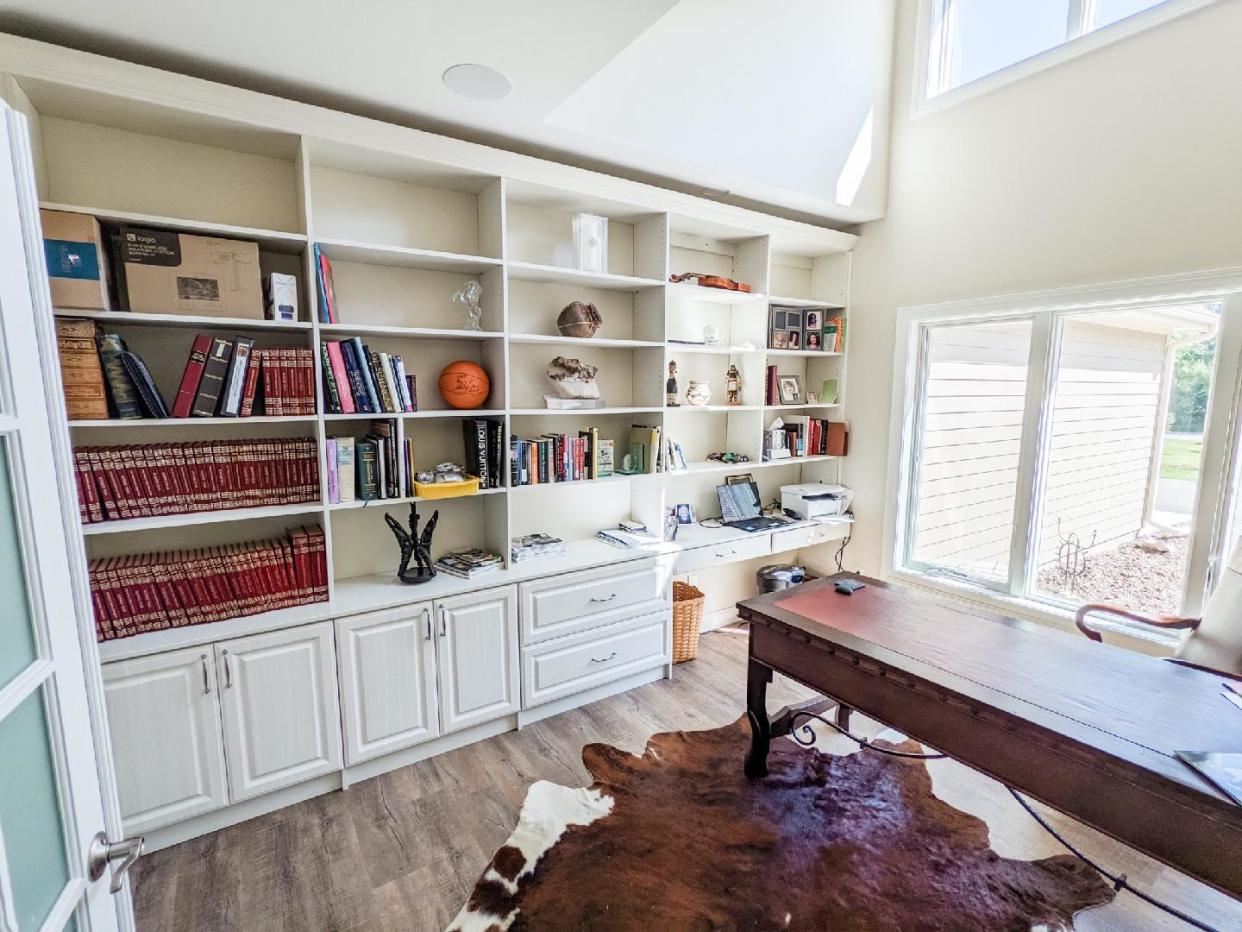
In just the past couple of years, workspaces have invaded our homes.
Seemingly overnight, the home office has become a big deal, even a necessity. It’s particularly true for homebuyers.
“I can’t tell you how many people, that’s at the top of their list, especially people with a family and children,” said Marie Grandelis, Realtor at the Shorewest Realty Brookfield-Waukesha office.
“People were scrambling to find space to work,” she said, when the pandemic shutdowns hit in 2020 and school was remote. "Since the pandemic, this has been much more on the buyer’s wish list than not. In many cases, it’s a requirement.”
Grandelis believes the desire for a home office is not a passing trend.
“I think it’s here to stay,” she said, ”and I’ve been a Realtor for 20 years. I’ve lived through a lot of housing trends.”
More:Tips for setting up a home office from a professional organizer
Home offices are a profound change
Home offices present a profound change in our dwellings, Grandelis explained. “We need to rethink how we use our house and the space we are creating.”
The remote or work-from-home paradigm may be here to stay. Hybrid schedules may be a new permanent reality, too.
Even people commuting to workplaces and retirees want home offices, Grandelis said. “People still want a space to go to,” she explained. "Retired" may mean consulting work, encore careers or volunteering.
While several factors can affect the amount a home office adds to a home’s value, having one will boost a home’s salability, Grandelis said. In some cases, buyers are even seeking two home offices.
For homeowners, it could make sense to finally invest in a dedicated workspace, even if retirement is imminent — or, find the best way to share space in a streamlined, multipurpose room.
In any case, design and organization are helpful in making a home office work.
Getting the office out of the dining room
Professional organizer Laura Gramann Richter, of Pieces Into Place, has seen interest in organized home offices, especially because people are bringing their work lives home. This adds a new complexity to the home, she explained, often spilling over into other areas of the home, and even our relationships.
“We already bring our phones,” she said. “It’s so difficult. Boundaries are becoming blurred.”
Take the dining room, for example. Has a makeshift home office put a crimp on dinners with friends and family? The constant view of electronic eyesores of monitors, printer, cords and paper piles sprawled over your buffet may behurting your home life.
Some people may want their dining room back.
Pieces Into Place, based in Merton, serves clients in southeastern Wisconsin. It provides services from consultation to construction and specializes in closets, pantries, garages, basements, craft rooms, play rooms and home offices.
A big emphasis for Richter's clients is multipurpose space, especially for those lacking room for a dedicated home office. Factor in students needing homework space and a spouse who may also work from home and the situation intensifies quickly.
Besides dining rooms, other places used as workspace include kitchen counters, basements, living rooms, closets and spare bedrooms. Richter does not recommend using bedrooms for home offices.
“The bedroom should be your sanctuary, a place for calm and reset and relationships and separating yourself from your working mindset so you can sleep peacefully and have that separation for your work/life balance,” she said.“It can impact your relationships, and you really want to be focused on your personal life in your bedroom when you are needing to rest and reconnect.”
Wherever the designated space ends up, decluttering may be necessary first.
“In the dining room, decluttering excess entertaining décor, serving platters, things that you got from your wedding that you haven’t taken out of the box from 10 years ago. Rehoming items which may include reselling on FacebookMarketplace or donating,” she explained.
Basements can bring their own set of challenges with clutter. “If it’s in the basement, then there is at least 20 years of accumulation of delayed decision making,” she said.
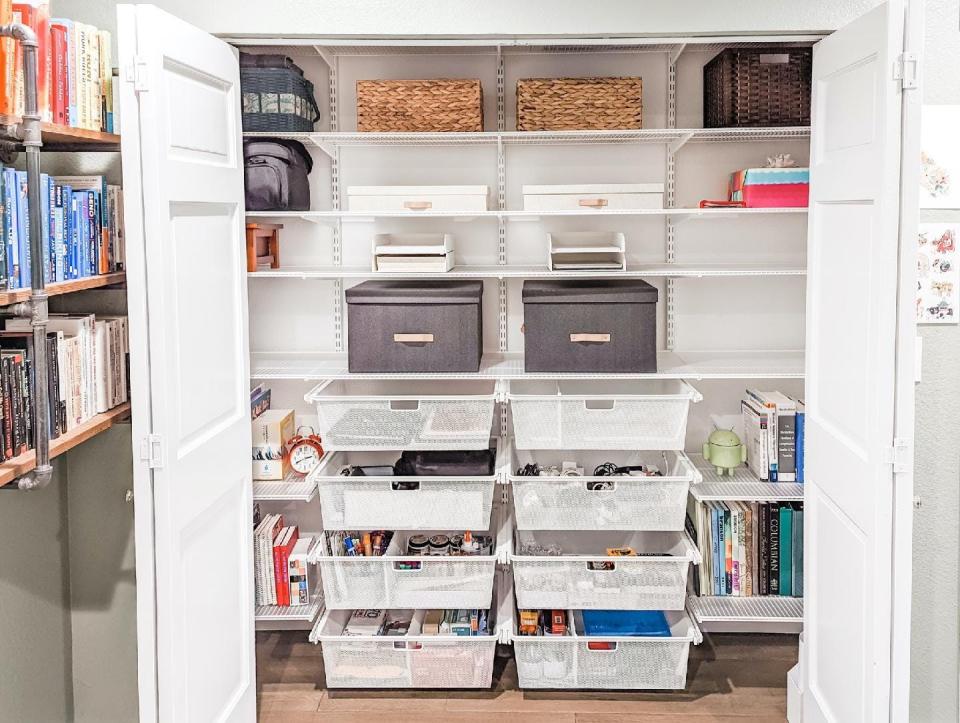
Where you set up shop depends on your line of work and how much space you need, plus your home’s size and layout, Richter said.
If multiple computer monitors, printer and privacy are needed, a dedicated office space should be a priority. Conference calls, Zoom meetings and a need for quiet will also drive the location.
As far as design goes, don’t fall into the trap of wanting a minimalist, stunningly beautiful work area often depicted in the media. A workspace needs to be functional. Home office stuff is inevitable, and "it’s going to live somewhere,” she said.
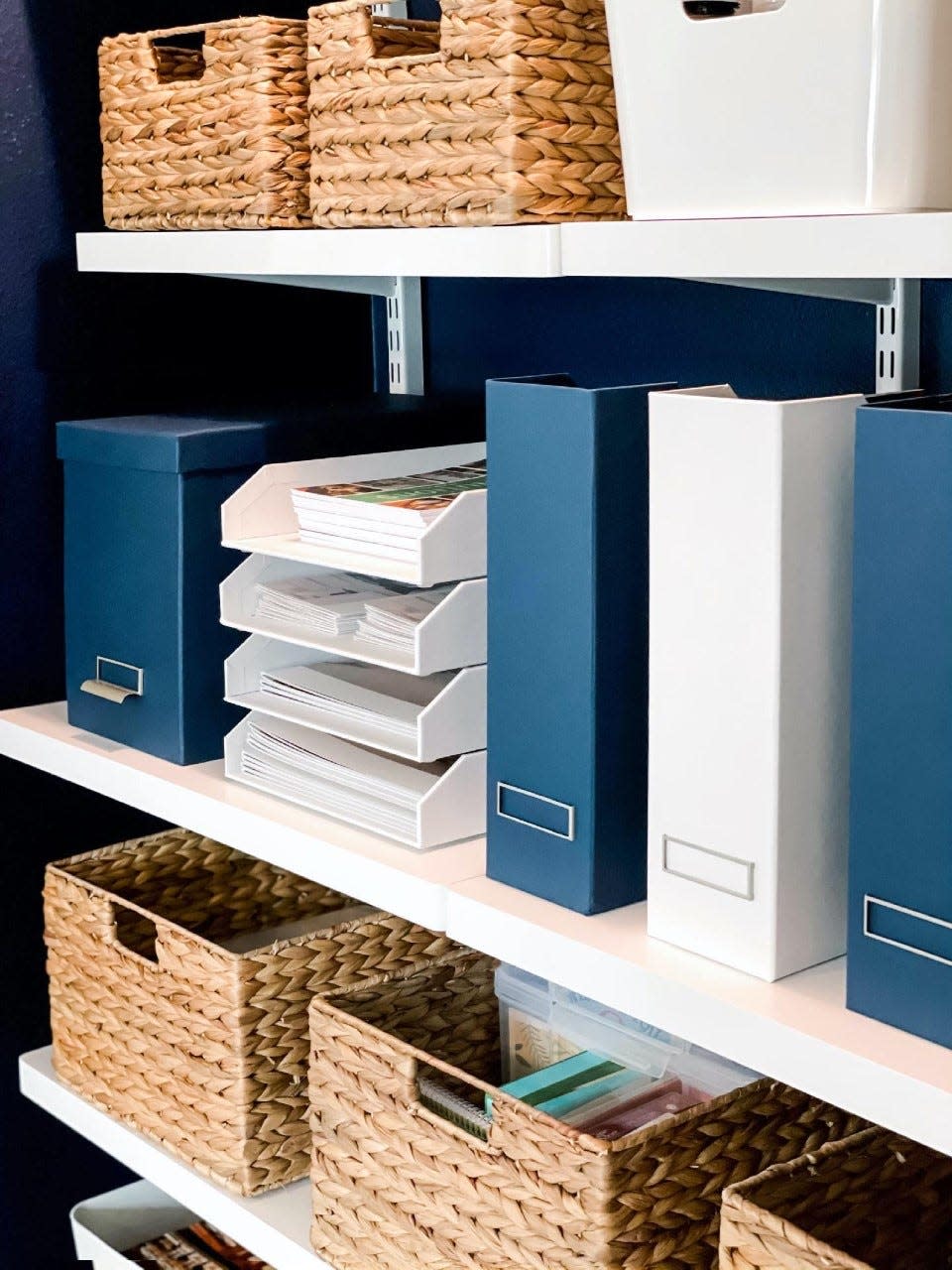
You can spend more time with the dog — maybe
Having an organized home office will help you be more efficient in your job, Richter said.
“Studies have shown that up to 30% of employees’ time is spent looking for things. Documents, emails,supplies, you are just constantly searching. If you don’t have an organized system … you are going to be wasting time that is so valuable for your productivity,” she said.
Having an organized workspace will help prevent feeling overwhelmed or stressed, Richter added. If the work area is chaotic, employee and team relationships can suffer. With video conference calls, prepare an organized, calm background or use a screen filter. Video backgrounds are a “big reflection of you,” Richter said. “People don’t want to see clutter and chaos, they want to be focused on you and your message.”
Also, being efficient can improve personal relationships with family members, roommates and even pets. “Control what you can control, and it will make everything else seem more manageable,” she said.
One of the benefits of remote work is spending more time with your dog or cat. “There are so many dog bed options available if you want the dog to be welcomed in your workspace,” she said. If a pet will disrupt your work, she recommended upgrading to a deluxe bed elsewhere in the home that’s plush and possibly heated that will make a pet content while you work.
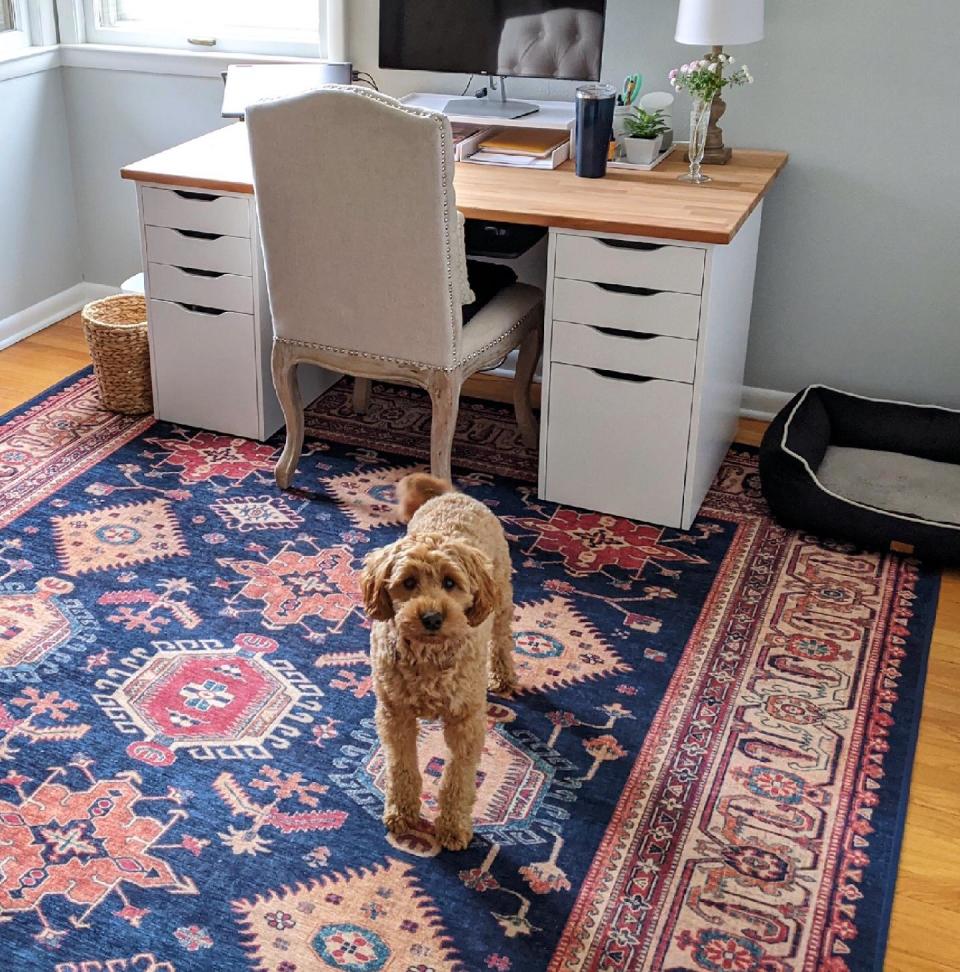
For décor, oak and dark colors are back
Demand for remodeling the home to include a home office has increased since the pandemic, according to Mary Sweet, interior designer for Bartelt Remodel in Delafield. Some of her clients were fed up with temporary fixes.
“Now that we are several years into this … they are making home offices more permanent,” she said of her clients.
As for home office design, Sweet offered some advice.
“It’s good to have a door for privacy but not always a solid door,” Sweet said. Glass doors will let in light, plus others can see if you’re on a call or occupied. Doors also help with sound reduction.
In the rooms, darker colors dominate, along with medium wood tones, Sweet said.
“Deep, deep navies, rich oak cabinetry, white oak cabinetry. People are doing rich and sophisticated colors,” she said.
Built-in desks and shelves are common, with paneling or wood treatments even on the ceiling. Both painted and wood-stained built-ins are popular.
Sweet stressed that lighting is crucial for home offices and helps set the design tone. Lamps and wall sconces add personality, she said.
If space allows, squeeze in a comfy upholstered chair or loveseat. “There is no need to be shackled to a desk all day,” Sweet said.
While dining rooms and spare bedrooms can be converted into home offices, clients sometimes opt for remodeling the basement, Sweet said.
Only a few clients are adding square footage solely for a home office, as it can be expensive.
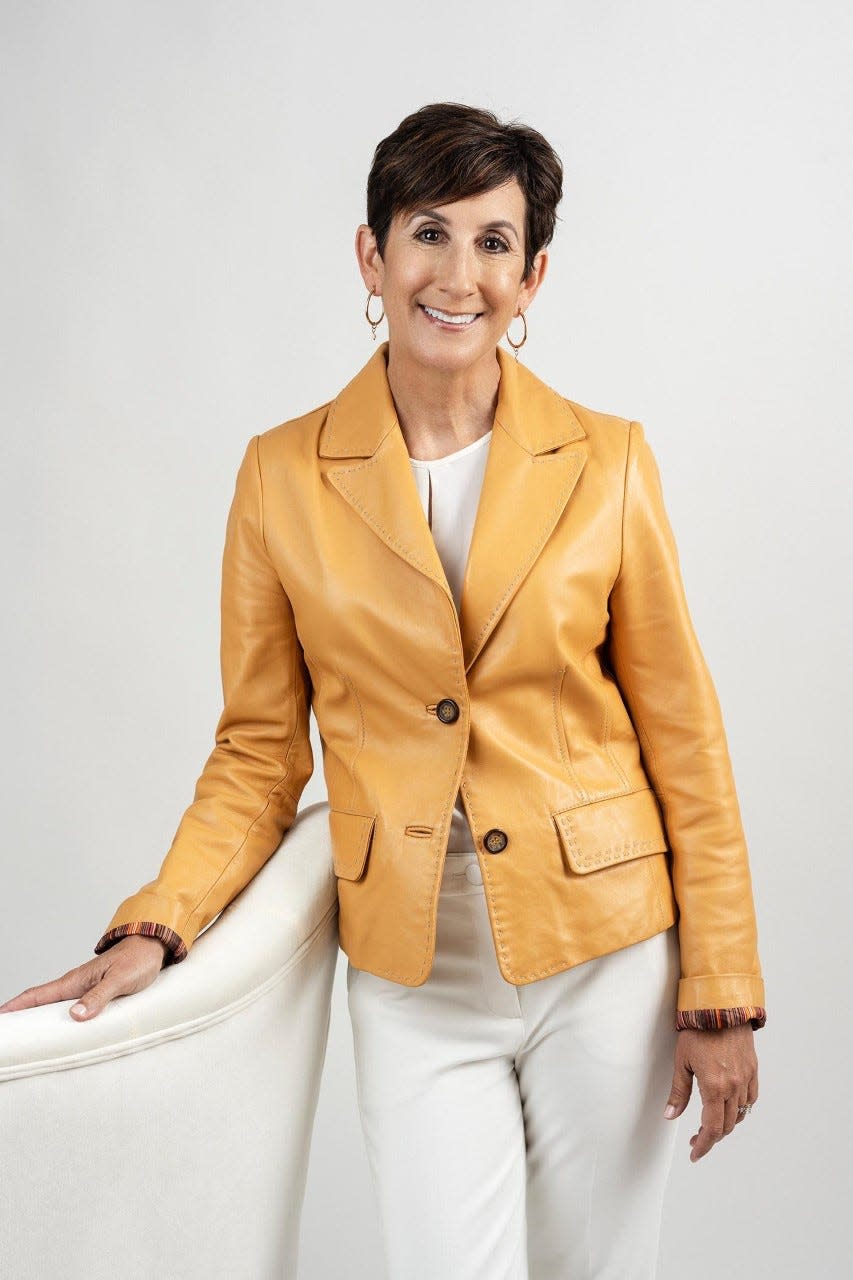
Be the boss of your own office
Sweet has found that home offices appeal to people with varied situations, including those who are retired. Half of her clients for home offices have been retired homeowners.
They want a place to keep their lives organized, pay bills, or be active in charity work, Sweet said. The oldergeneration is more attached to paper over digital files and may need more space for storage, she said.
Overall, be the boss of your home office. Having one is a chance to tailor it to your tastes and your home’s aesthetic.
Make it welcoming and motivating, Sweet said.
“A home office is a great way to bring personality into your work space,” she added. “Make it an extension of your home.”
Jennifer Rude Klett is a Wisconsin freelance writer of Midwestern life and author of “Home Cooking Comfort,” contact her at jrudeklett.com. Follow her on Facebook at Jennifer Rude Klett: Nonfiction Writer.
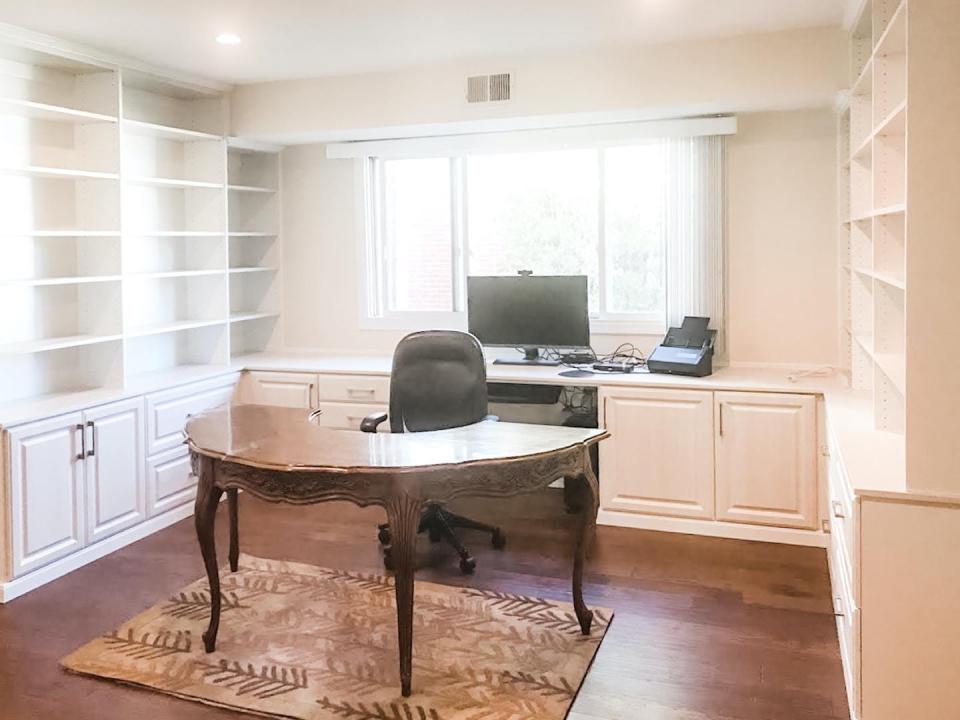
Is it an office, den or study?
What exactly constitutes a home office? Is it more than a glorified planning desk in the kitchen? And, how do home offices differ from a den, study or library?
“A home office is a dedicated office where you can close the door. It is a dedicated work-from-home space,” said longtime Realtor Marie Grandelis from the Brookfield-Waukesha office of Shorewest Realty.
In contrast, a den, study or library is a place to escape or get away to read, watch TV or just hang out.
Dens are often considered mini family rooms, according to Grandelis. Home libraries will have more of an emphasis on books and bookshelves. A library is somewhat of an archaic term in real estate, she said, and the terms library and study are sometimes used interchangeably.
Another distinguishing factor of a home office can be its location. Home buyers often want it in the main hub, not tucked away.
“They really want it on the main floor,” Grandelis said. “Close to the heart of the house but having a designated door to close.”
Basements are acceptable but remote places for home offices for her clients, she said. Basements without a window can be dark and less desirable.
Our subscribers make this reporting possible. Please consider supporting local journalism by subscribing to the Journal Sentinel at jsonline.com/deal.
DOWNLOAD THE APP: Get the latest news, sports and more
This article originally appeared on Milwaukee Journal Sentinel: Home offices are big. Here's why, and what designers are seeing

